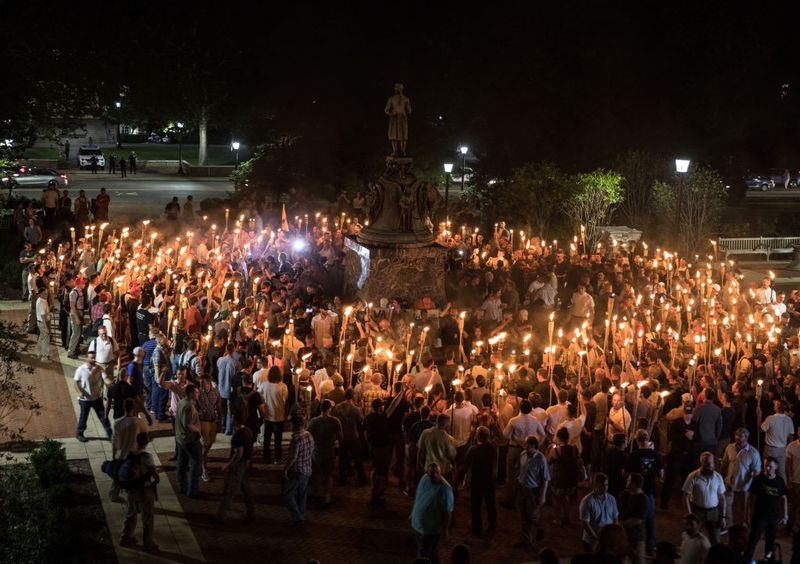The University of Virginia was apparently caught off guard Friday when hundreds of white supremacists marched through the iconic campus carrying lit torches. But with more alt-right protests planned this coming weekend, and white nationalist Richard Spencer seeking to hold an event in September at the University of Florida, other schools should take note and be prepared. There’s lots a campus can do to block disruptive protest that is consistent with the First Amendment. There are also some limits that can’t– and shouldn’t — be crossed.
Start with the control of public space. Private universities have the option of blocking access to their campuses and flatly prohibiting outsiders from marching or protesting.
Although some private institutions may have internal rules that commit them to treating different viewpoints fairly, nothing in the First Amendment requires them to be neutral. To the contrary, a private institution has a First Amendment right to promote any viewpoint it wants and to discriminate against any viewpoint it would prefer to exclude. That’s why when private universities cancel speaker invitations, the speakers’ only recourse is criticism.
For public universities, like the University of Virginia, the issue is more complicated. Prevailing law treats them like a government actor. That means university property must be separated into legal categories: traditional public forums, analogous to public parks open to all; designated or limited public forums, which the university has opened to various forms of speech; and non-forums, where there is no practice of permitting free speech.
In a true public forum, the government can essentially never regulate based on the content of speech. The only exception would be where there is a compelling government interest in the prohibition and the ban is narrowly tailored to achieving that interest.
Some public universities’ main quads might count as classic public forums. The Rotunda and Lawn of the University of Virginia are national landmarks, designed by Thomas Jefferson, and are visited regularly by tourists. Arguably their Jeffersonian pedigree and symbolic importance might be reason to think of the Lawn, at least, as truly public.
The real legal test would be whether all people and all speakers have traditionally been able to say whatever they wanted in the forum.
In a true public forum, however, the government can still regulate the time, place and manner of speech. The university could require a permit for marching there, the same way municipalities lawfully require permits for marches and protests.
The permitting process could certainly incorporate safety concerns, provided they were applied even-handedly. It seems reasonable to ban torches or other open fires in a historic setting where students live. The only proviso is that the rules shouldn’t be drafted to prohibit certain symbolic messages rather than others — like banning KKK torches but not vigil candles of similar size.
In practice, a court might actually rule that the Lawn isn’t a classic public forum like a park or a town green or common. The university owns its own grounds. It makes rules for what can happen there, and it houses students and faculty on site.
That might turn parts of the campus into designated or limited public forums. In such cases, the university can regulate what the subject matter of speech will be, so long as it doesn’t discriminate on the basis of viewpoint. It could, for example, limit a forum to student rallies, but it couldn’t allow only Democrats and not campus Republicans. It could also limit speech to members of the university, rather than allowing outsiders to speak freely.
Other places on campus needn’t be free speech zones at all. Classrooms are regulated, and faculty can restrict the conversations that they want to take place there.
My own view is that universities, including public universities, would be well advised to stand on their rights to limit the presence of non-university speakers where possible and to stop their public spaces from becoming classic public forums.
On the surface, it may seem that such limitations would run counter to the free academic exchange of ideas.
But on closer examination, academic freedom and constitutional free speech are actually pretty different. In private universities, the act of creating a campus where academic freedom exists requires the creation of a community that shares certain scholarly norms. If students and teachers could shout each other down, free exchange of ideas on campus would quickly become impossible.
And in truth, public universities aren’t much different. To function as universities, they need to create an environment of communal commitment to exploring the truth. That includes, in my view, great latitude for expressing almost any imaginable viewpoint. But it does not include threats or harassment. And it does not allow for gross violations of civility.
Bloomberg
